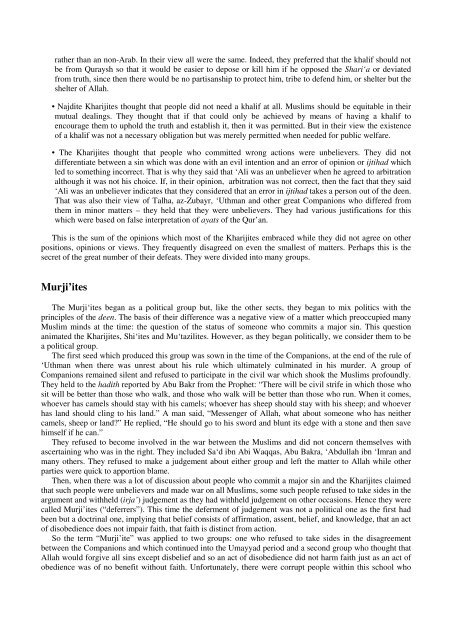Create successful ePaper yourself
Turn your PDF publications into a flip-book with our unique Google optimized e-Paper software.
ather than an non-Arab. In their view all were the same. Indeed, they preferred that the khalif should not<br />
be from Quraysh so that it would be easier to depose or kill him if he opposed the Shari‘a or deviated<br />
from truth, since then there would be no partisanship to protect him, tribe to defend him, or shelter but the<br />
shelter of Allah.<br />
• Najdite Kharijites thought that people did not need a khalif at all. Muslims should be equitable in their<br />
mutual dealings. They thought that if that could only be achieved by means of having a khalif to<br />
encourage them to uphold the truth <strong>and</strong> establish it, then it was permitted. But in their view the existence<br />
of a khalif was not a necessary obligation but was merely permitted when needed for public welfare.<br />
• The Kharijites thought that people who committed wrong actions were unbelievers. They did not<br />
differentiate between a sin which was done with an evil intention <strong>and</strong> an error of opinion or ijtihad which<br />
led to something incorrect. That is why they said that ‘Ali was an unbeliever when he agreed to arbitration<br />
although it was not his choice. If, in their opinion, arbitration was not correct, then the fact that they said<br />
‘Ali was an unbeliever indicates that they considered that an error in ijtihad takes a person out of the deen.<br />
That was also their view of Talha, az-Zubayr, ‘Uthman <strong>and</strong> other great Companions who differed from<br />
them in minor matters – they held that they were unbelievers. They had various justifications for this<br />
which were based on false interpretation of ayats of the Qur’an.<br />
This is the sum of the opinions which most of the Kharijites embraced while they did not agree on other<br />
positions, opinions or views. They frequently disagreed on even the smallest of matters. Perhaps this is the<br />
secret of the great number of their defeats. They were divided into many groups.<br />
Murji’ites<br />
The Murji‘ites began as a political group but, like the other sects, they began to mix politics with the<br />
principles of the deen. The basis of their difference was a negative view of a matter which preoccupied many<br />
Muslim minds at the time: the question of the status of someone who commits a major sin. This question<br />
animated the Kharijites, Shi‘ites <strong>and</strong> Mu‘tazilites. However, as they began politically, we consider them to be<br />
a political group.<br />
The first seed which produced this group was sown in the time of the Companions, at the end of the rule of<br />
‘Uthman when there was unrest about his rule which ultimately culminated in his murder. A group of<br />
Companions remained silent <strong>and</strong> refused to participate in the civil war which shook the Muslims profoundly.<br />
They held to the hadith reported by <strong>Abu</strong> Bakr from the Prophet: “There will be civil strife in which those who<br />
sit will be better than those who walk, <strong>and</strong> those who walk will be better than those who run. When it comes,<br />
whoever has camels should stay with his camels; whoever has sheep should stay with his sheep; <strong>and</strong> whoever<br />
has l<strong>and</strong> should cling to his l<strong>and</strong>.” A man said, “Messenger of Allah, what about someone who has neither<br />
camels, sheep or l<strong>and</strong>?” He replied, “He should go to his sword <strong>and</strong> blunt its edge with a stone <strong>and</strong> then save<br />
himself if he can.”<br />
They refused to become involved in the war between the Muslims <strong>and</strong> did not concern themselves with<br />
ascertaining who was in the right. They included Sa‘d ibn Abi Waqqas, <strong>Abu</strong> Bakra, ‘Abdullah ibn ‘Imran <strong>and</strong><br />
many others. They refused to make a judgement about either group <strong>and</strong> left the matter to Allah while other<br />
parties were quick to apportion blame.<br />
Then, when there was a lot of discussion about people who commit a major sin <strong>and</strong> the Kharijites claimed<br />
that such people were unbelievers <strong>and</strong> made war on all Muslims, some such people refused to take sides in the<br />
argument <strong>and</strong> withheld (irja’) judgement as they had withheld judgement on other occasions. Hence they were<br />
called Murji’ites (“deferrers”). This time the deferment of judgement was not a political one as the first had<br />
been but a doctrinal one, implying that belief consists of affirmation, assent, belief, <strong>and</strong> knowledge, that an act<br />
of disobedience does not impair faith, that faith is distinct from action.<br />
So the term “Murji’ite” was applied to two groups: one who refused to take sides in the disagreement<br />
between the Companions <strong>and</strong> which continued into the Umayyad period <strong>and</strong> a second group who thought that<br />
Allah would forgive all sins except disbelief <strong>and</strong> so an act of disobedience did not harm faith just as an act of<br />
obedience was of no benefit without faith. Unfortunately, there were corrupt people within this school who














